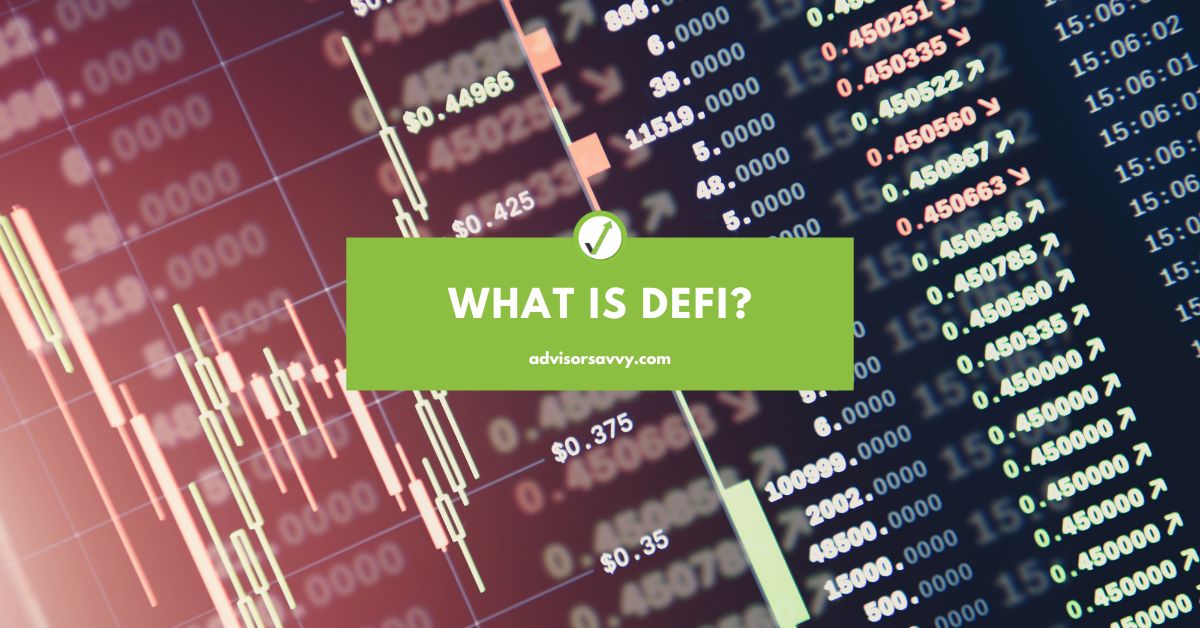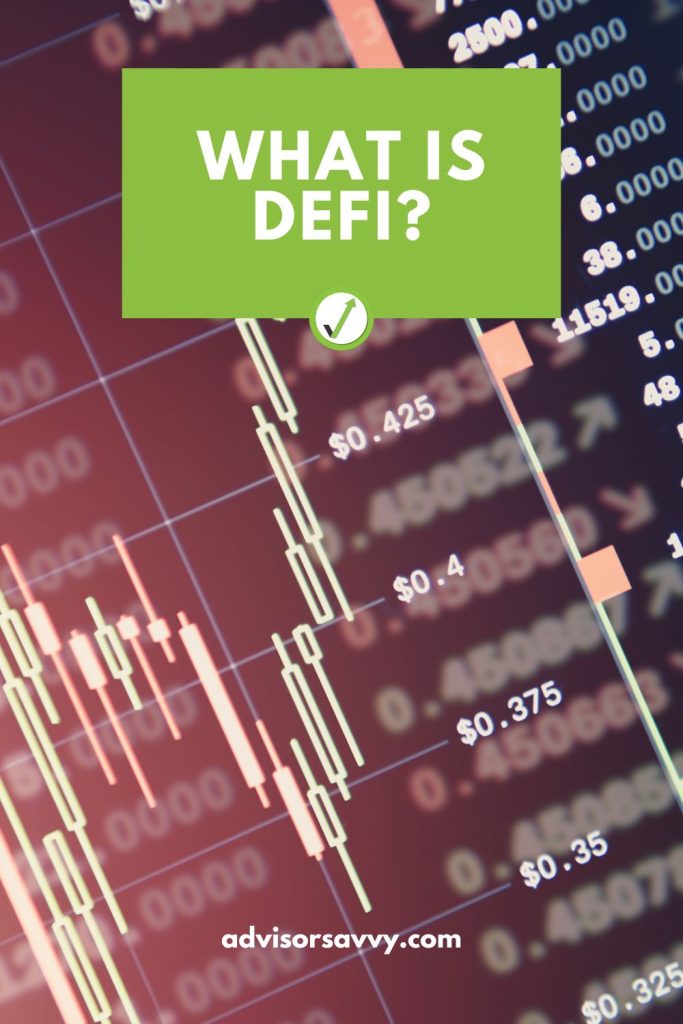
Ever wondered why nobody questions the traditional investment or loan landscape? It feels like banks have overarching power and control, permitted the privilege to dive deep into your history and reject you based on stringent policies. The world of DeFi stands up to the limitations of traditional lending. But what is DeFi lending and how does it work with cryptocurrency? Keep reading to find out!

Table of contents
What is DeFi?
DeFi is a decentralized financial system. Hang on, are we talking about Bitcoin or other cryptocurrency here? In a way, yes, but DeFi is the bigger picture.
DeFi encompasses all financial services performed on a decentralized system, often a blockchain. Imagine conducting your regular day-to-day banking through Ethereum. We’re talking mortgages, personal loans, savings accounts, insurance policies, and pretty much any other financial service as an alternative to traditional banking.
Your mind might wander to Coinbase and other cryptocurrency exchanges, but that’s not quite DeFi. Instead, DeFi takes on the ambitious goal of the bank, insurance provider, lender, and even replaces cryptocurrency exchanges like Coinbase.
Why? Well, crypto exchanges aren’t fully decentralized. The companies that offer paid services to help you obtain or manage crypto demonstrate a centralized financial system — they just don’t tell you.

Match to your perfect advisor now.
Getting started is easy, fast and free.
What does DeFi stand for?
DeFi is short for decentralized finance. In essence, it’s a platform that is comparable to traditional financial systems, but is decentralized instead of centralized.
Related Reading: Centralized vs Decentralized Exchanges
How does DeFi work?
DeFi allows for financial interactions without a bank or other authority in between. Normally, when a transaction takes place, such as buying a stock or making a purchase with your credit card, the transaction is facilitated by a third party, in these two instances it would be the exchange or bank. With DeFi, there is no third party involved in the transaction which is why it’s unique.
The idea is that two parties could execute a transaction with nothing more than the smart contracts of a blockchain. These contracts only perform once the parties meet certain conditions, creating a financial environment of proof of work and verification. But DeFi transactions here go further than simple currency transfers. Decentralized finance speaks to borrowing, lending, investing, and every other financial activity you can think of.
What is the difference between crypto and DeFi?
Crypto refers to any digital currency maintained on a decentralized system, notably a blockchain ledger. Backed by cryptography or a series of coding equations, cryptocurrency is verified in a peer-to-peer system without requiring a bank or other centralized system. DeFi echoes the same private, open values of cryptocurrency. However, it encompasses much more than just the coin itself. Decentralized finance refers to the whole landscape, including all sorts of financial activities within a decentralized space.
Let’s make it simple: if crypto is the fiat alternative, decentralized finance is the banking or financial system alternative. In other words, crypto and DeFi interact with one another and are components of a financial system, but they’re not the same thing.
What are examples of DeFi?
DeFi examples include any financial activity possible, except in a decentralized manner as opposed to a centralized manner. For instance, borrowing, lending and trading. However, lending is the most popular form of a DeFi transaction. Some examples of DeFi platforms include DeFi Swap, UniSwap and Curve.
Related Reading: Is Bitcoin Legal in Canada?
What is DeFi Lending?
DeFi lending is a hot topic in the overall financial landscape. Imagine borrowing using a mortgage and backing it with the value of your existing cryptocurrency. Or, lending your existing cryptocurrency at interest. These are examples of DeFi lending.
At the moment, these options are not available at a traditional bank because they are centralized and don’t accept Bitcoin or other cryptocurrency. While it’d be difficult to swing either of these options with a bank, most DeFi enthusiasts wouldn’t want to anyway. But why not?
For starters, DeFi lending doesn’t subject you to the seemingly arbitrary requirements of an A-list lender. No credit checks, long-winded applications, or references. And for the lender? It’s a solid way to make even more of an investment on your cryptocurrency assets. Instead of keeping it in your wallet and waiting for it to fluctuate with the market, you can earn a high yield separate from those volatile fluctuations. Think about it: instead of leaving your coins sitting in a zero-interest environment, DeFi lending allows you to make the coins work for you. In addition, it expands the market which is favorable to those who are already invested.
Still, it’s not always easy to decide with whom you’ll invest your crypto assets. Monolith, the world’s first DeFi wallet, proposes yield optimization tools as a solution. Tools like Yearn. Finance for Ethereum allows you to deposit your crypto assets into liquidity pools that garner the best available rates.
What is DeFi Staking?
DeFi staking is a commitment of your crypto assets for a passive return — but this commitment is much more valuable than that. It acts as a validator for smart contracts, or blocks. Working on the Proof-of-Stake framework, staking keeps DeFi ecosystems running without the same computational demands of the Proof-of-Work model. In simpler terms, DeFi staking is the process of validating transactions, supporting liquidity and the individual earns a profit for doing so.
Of course, there are risks associated with DeFi staking including market risk, liquidity risk and potentially loss of assets. However, many argue the profit outweighs the risks.
How Does DeFi Make Money?
DeFi makes money the same way banks and financial institutions make money — through interest and lending fees. Those who lend their crypto assets to others will earn a profit from borrowers. Of course, DeFi hasn’t been perfected so some make money through fraudulent, criminal activity.
How Can You Invest?
Interested in getting involved in DeFi investing? Step one is to obtain a crypto wallet and load it. MetaMask is a common wallet for DeFi investors for its coin exchange and access to blockchain applications.
Other popular DeFi wallets and platforms include:
- DeFi Swap
- ZenGo
- Trust Wallet
Next, you’ll need to use a DeFi app to trade, lend, or borrow cryptocurrency, like:
- Compound
- Aave
- MakerDAO
- Liquity
Related Reading: Best Cryptocurrency ETFs in Canada for 2022
Advantages and Disadvantages of DeFi
DeFi sounds like a fabulous way to conduct more autonomous investing. However, the practice comes with some pros and cons. Before jumping into DeFi, be sure to consider all aspects to ensure it’s the correct decision for you.
What are the benefits of DeFi lending?
- Fast verification and overall process. Traditional lending avenues entail a lengthy back-and-forth for verification, from authenticating employment to credit score check. DeFi lending is permissionless and carried out automatically through blockchain calculations, resulting in a much speedier process.
- Accessibility. Traditional lending demands endless verification like creditworthiness and history, as well as citizenship and tax items. DeFi requires only cryptocurrency collateral (sometimes even NFTs), making loans more accessible. As asset portfolio tracker Kubera shares, accessibility comes when we lose the policing, gatekeepers, processing, and endless fees.
- Reduced discrimination. Lenders tend to favor those who meet their specific criteria which can cause discrimination. While this discrimination is often unintentional and is in place to ensure the banks make money, it can negatively affect people who don’t fit the mold. How will these people obtain financing to achieve their goals? The cultural and human elements even behind the biggest financial institutions allow this risk. DeFi lending is more widely available and caters to a broader range of people.
- Transparency. Who really knows how your money is traded and dispersed when investing with a bank? DeFi lending uses a distributed ledger that shows you every single transaction. At any point in time, you can see what’s going on.
- New source of income and collateral through cryptocurrency. Before, you could only earn income on cryptocurrency through market fluctuations. Of course, you could argue that holding crypto assets in general allow you more autonomy than fiat currency which, in turn, could help you retain more value in the long run. Still, you couldn’t earn interest on a crypto savings account. DeFi lending allows you to do this. Similarly, aspiring borrowers now have a new collateral source to back a loan.
What are the risks of DeFi lending?
- Volatility. Good things don’t last — well, that’s a bit harsh. We’ll go with… Good things don’t always last long. If you transfer any crypto assets into a liquidity pool, they can lose half their value in a day more easily than fiat currency.
- Fraud prevalence. We’ve all heard of cryptocurrency scams, but DeFi scams are getting more sophisticated, too. Recently, fraudsters specifically targeted DeFi investors and scammed over $80 million. Be weary of any site or borrower that demands an upfront fee to invest or too-good-to-be-true security promises from new players. Unfortunately, experts predict even more DeFi scams in 2023. If you choose to get involved, don’t be naïve that you couldn’t fall victim to a scam!
- Over-collateralization. Cryptocurrency’s volatility translates to a requirement for over-collateralization of loans. Meaning? You could be forced to back a loan by up to 150%, much higher than with fiat loans. But maybe it’s worth it to the borrower who doesn’t want to submit to a credit check or provide personal information. It’s give and take.
Should you invest in DeFi?
So, what is DeFi lending worth in today’s financial landscape? If you believe in the values behind crypto, you’re likely primed to give DeFi a shot.
DeFi can forever change the lending landscape across the globe. It allows for an immutable, non-discriminatory, and efficient avenue to borrow and invest without the bureaucracies and human error of banks. However, DeFi is still a risky endeavor. You’re working with a much newer financial system that’s riddled with shady characters and scammers. In addition, it could take some time for the flaws of DeFi to be ironed out. Our advice? Tread carefully. DeFi investing is a great way to diversify your portfolio or earn interest on your existing crypto assets, but it’s not infallible.
Read More: What is the Best Bank in Canada?

